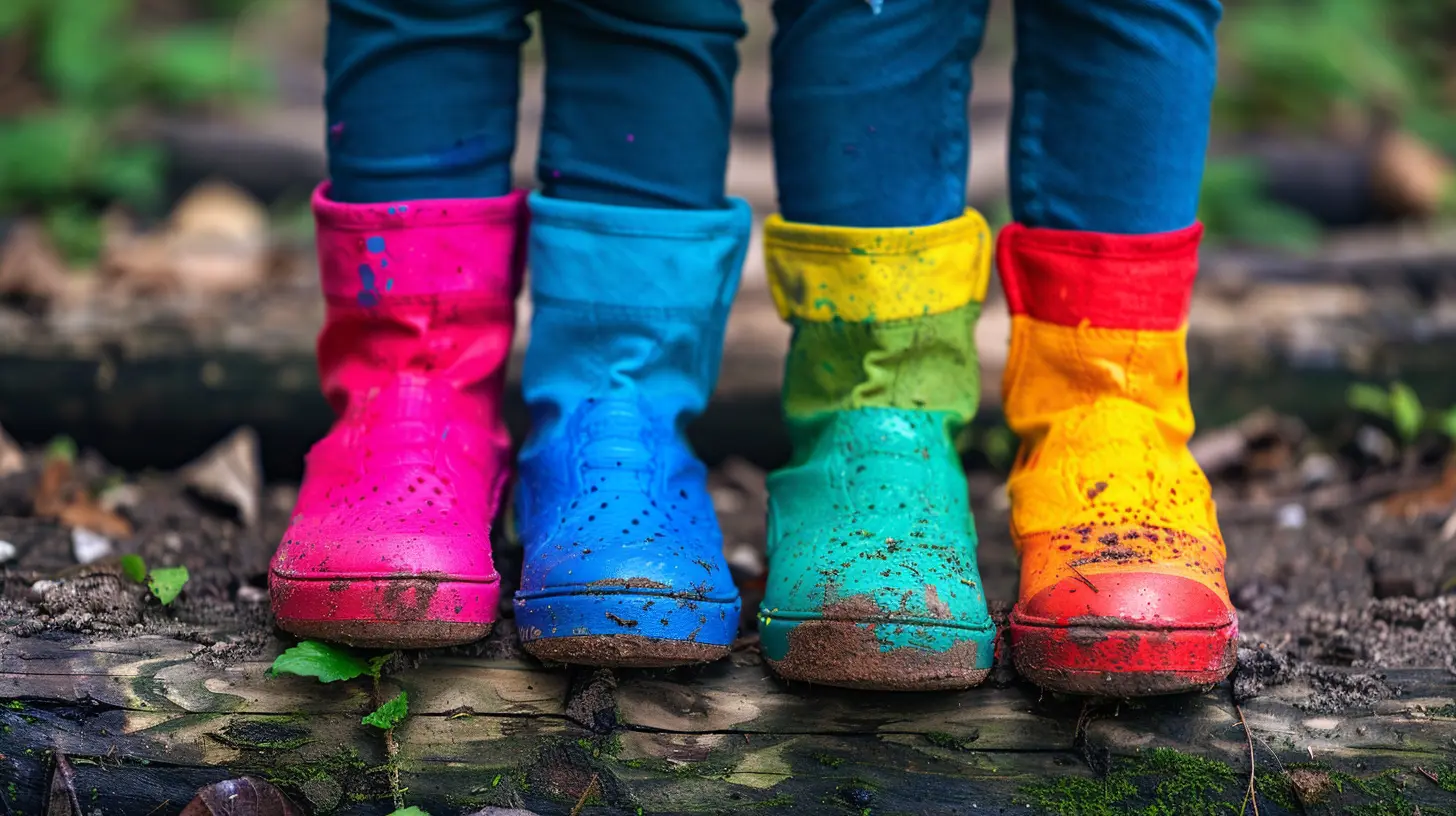Why Your Child’s Digital Footprint Matters More Than You Think
6 November 2025
Let’s cut straight to the chase: your 8-year-old may not be running for public office (yet), but their digital footprint is already being created. Yep, that TikTok dance, that Minecraft username, or even that preschool graduation video you proudly posted on Facebook—those breadcrumbs of data? They’re not going anywhere anytime soon.
Welcome to parenting in the 21st century, where baby books come with hashtags and your kid's online persona might just outlast their childhood. But don’t worry—you don’t need a degree in cybersecurity to keep up. You just need a little awareness, a lot of common sense, and maybe a few less Facebook posts about potty training milestones.
Let’s break it down, shall we?
What Exactly Is a Digital Footprint Anyway?
Think of it like digital glitter. Once it’s out there, it sticks. Forever. Your child’s digital footprint is the trail of data they leave behind while using the internet. It includes:- Photos and videos (even the ones you post on their behalf)
- Social media activity
- Comments, likes, and shares
- Online searches
- Apps and games they use
- Any account ever created in their name
Now, while that might sound innocent enough for a toddler whose most controversial opinion is about which dinosaur is cooler, it’s not just about today—it’s about tomorrow.
Why Should You Even Care? It's Just the Internet, Right?
Oh, if only that were true. But today’s virtual sandbox isn’t just fun and games. It’s more like a giant filing cabinet, storing every meme, funny username, and awkward school project your child has ever shared. And guess what? That cabinet doesn’t have a delete button.Here’s why you should definitely care:
- Colleges are watching. Yep, admissions officers Google applicants.
- Employers are watching. So are internship programs, scholarship panels, even potential collaborators.
- Strangers are watching. Creepy but true.
- Your kid is learning internet habits from YOU. No pressure...
The Oversharenting Epidemic: Are You Part of the Problem?
Let’s be honest here. Have you ever posted a photo of your child eating spaghetti like a feral raccoon? Of course you have. It's adorable. But here's the thing: that seemingly harmless pic could still contribute to their future online identity.“Sharenting” (sharing + parenting) is totally normal these days. We’ve all done it. But oversharenting can:
- Expose kids to online embarrassment down the line
- Make them targets for cyberbullying
- Put their privacy and security at risk
- Create trust issues between you and your child when they grow up
Ask yourself: Would your teenager want that bathtub baby photo living its best life on Google Images?
Stranger Danger Has Gone High-Tech
Remember when "don't talk to strangers" just meant avoiding creepy vans at the park? Now it’s about not clicking on suspicious links, sharing personal info, or chatting with “Jake2048” who claims he's 12 but types like he’s pushing 50.Children are naturally curious, and the internet is like giving a kitten yarn… endless and chaotic. But with great power (aka internet access) comes great responsibility. If they’re not aware of what they’re sharing, it could be used against them.
Phishing scams, data mining, identity theft? Not just grown-up problems anymore.
Location Tags, Profiles, and Other Sneaky Footprint Claus
Ever tagged a photo with “First day at Maple Grove Elementary”? Boom. You’ve just publicly shared where your child goes to school.Little things add up:
- Tagging locations
- Using real names in usernames
- Sharing schedules (e.g. soccer practice every Thursday at 5pm)
- Birthday shoutouts with the year they were born ("Happy 10th to this little guy!")
Each of these adds pieces to the puzzle—data privacy criminals are practically doing a happy dance.
The “But Everyone’s Doing It!” Dilemma
Raise your hand if your child says, “But all my friends have Snapchat accounts!”Ah yes, the modern-day struggle bus we all board eventually. Here’s the scoop: just because other 9-year-olds are diving headfirst into social media doesn’t mean yours should too.
Social platforms are designed for data collection. That’s not even tinfoil hat talk—it’s just business. Even passive actions (scrolling, watching videos) add to their data profiles.
So when your kid claims it’s harmless fun, remind them (and yourself) that even lurking leaves footprints.
Teaching Digital Citizenship (Without Sounding Like a Buzzkill)
You don’t need to turn your child into a tech-paranoid recluse, but you do want to raise a mini internet ninja—someone who knows when to scroll past, when to speak up, and when to shut it down.Here’s how:
- Talk early and often. If they can operate an iPad, they can start learning digital safety.
- Ask questions. Not in an interrogation way, more like “What do you like doing on Roblox?”
- Model responsible behavior. Yep, that means checking yourself before you post that temper tantrum video.
- Google them periodically. Creepy? Maybe. Wise? 100%.
What You Post About Them Today Could Haunt Them Tomorrow
Let’s imagine for a moment: Your kid’s applying for their dream scholarship at 17. The committee types their name into Google and there it is—a blog post from you in 2014 detailing your toddler’s epic diaper blowout.Oof.
You might think, “That’s harmless! It’s just a cute memory!” But the internet doesn’t have context. It just has content. And unfortunately, once it’s out there, it’s up for interpretation.
How to Reduce Your Child’s Digital Footprint (Without Going Full Hermit)
We’re not suggesting you erase your child from the internet like a spy movie. (Although that would be kinda cool.) We’re talking BALANCE.Here’s how to dial it back:
- Use nicknames or initials when posting stuff publicly.
- Tighten your privacy settings—social media, cloud storage, apps, you name it.
- Avoid location tags. Just don’t.
- Set up a family agreement for screen time and app usage.
- Create anonymous profiles for games and online forums.
- Teach password hygiene early. “1234” just isn’t going to cut it, even for a kid.
The Tech They Use Today Sets Habits for Tomorrow
We all remember our first AIM screen name. (RIP, xoxoPuppyLuv1997.) But today’s screen names matter a lot more. The digital habits your child forms now will impact how they interact with tech for the rest of their lives.So while they might not care about data privacy today, teaching them about it can become as second nature as brushing their teeth. You probably won’t see results overnight, but down the road, Future-You will send Present-You a standing ovation.
Takeaway: Parenting in the Digital Age Means Thinking Two Steps Ahead
Managing your child’s digital footprint doesn't mean banning all devices and going off-grid. (Though we’ve all fantasized about it, let’s be honest.) It just means being a little more intentional about what goes online, who’s seeing it, and how it could affect your child down the road.Digital footprints are the new baby footprints—and trust me, they're way harder to scrub off.
So the next time you feel tempted to share that hilarious video of your toddler singing Beyoncé into a banana, maybe pause and ask yourself: "Will this still be cute when they're 16?"
Hint: Probably not.
Final Thoughts: Your Kid's Future Self Will Thank You
We teach our kids to look both ways before crossing the street, eat their veggies, and say “please” and “thank you.” Think of digital awareness as just another life skill—one they desperately need in the Wi-Fi-filled jungle of modern life.Your child’s digital footprint is like a tattoo on the internet’s memory—it’s permanent, visible, and sometimes a little embarrassing if made on impulse. So let’s teach them to ink wisely.
And maybe, just maybe, let’s stop tagging them in every family brunch photo.
all images in this post were generated using AI tools
Category:
Tech And KidsAuthor:

Noah Sawyer
Discussion
rate this article
1 comments
Lysara Benton
Understanding your child's digital footprint is crucial in today’s tech-driven world. It shapes their online identity, influences future opportunities, and can impact their safety. By guiding them on responsible digital behavior, you empower them to navigate online challenges while fostering a positive and lasting impression in the digital landscape.
November 6, 2025 at 4:55 AM

Noah Sawyer
Thank you for highlighting the importance of a child's digital footprint! It's vital for shaping their identity and opportunities. Educating them about responsible online behavior is key to their safety and success.


